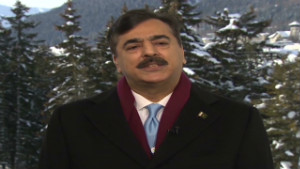MOSCOW: Pakistan and Russia on Wednesday agreed to promote and enhance bilateral relations in different fields including trade, energy and people to people contacts.
Foreign Minister Hina Rabbani Khar met her Russian counterpart Sergey Viktorovich Lavrov in Moscow on Wednesday. Khar, on a three day visit to the Russian Federation, held in-depth talks with Lavrov on expanding and diversifying relations between Pakistan and Russia.
The two foreign ministers exchanged views on regional and global issues of mutual interest. They also discussed increasing cooperation in energy, infrastructure development, agriculture, science and technology sectors.
Addressing a joint press conference after the meeting, Khar said there has been a scope for cooperation between the two countries in different areas and all aspects for improving cooperation had been discussed.
Answering a question on Afghanistan, the Pakistani foreign minister said that Pakistan had a clear policy on extending full help and cooperation to any Afghan-led, Afghan-owned and Afghan-owned peace initiative as it was the only solution to the problem.
She said both countries had also agreed to enhance parliamentary interaction besides increasing cooperation on the foreign minister level.
Energy sector cooperation
Khar said that the Turkmenistan-Afghanistan-Pakistan-India project (TAPI) and the Central Asia South Asia Regional Energy & Trade (CASA-1000) project were also discussed during the meeting.
She said Pakistan had received a very encouraging response from Russia for more investment in Pakistan Steel Mills and an interest in investing in different energy projects like Thar Coal.
“We are looking forward for the energy group meeting to be held within the first half of this year,” said the Pakistani foreign minister.
Regional cooperation
Speaking on regional cooperation, Khar said the Shanghai Cooperation Organisation (SCO) was an exceptionally important forum and that Pakistan had been actively participating in the deliberations of the SCO and seeking permanent membership, and also thanked Russia for extending support in this matter.
Khar said that Pakistan was looking forward to hosting the next quadrilateral summit. She said she had extended invitation to the Russian leadership on behalf of President Asif Ali Zardari for the summit.
Foreign Minister Hina Rabbani Khar met her Russian counterpart Sergey Viktorovich Lavrov in Moscow on Wednesday. Khar, on a three day visit to the Russian Federation, held in-depth talks with Lavrov on expanding and diversifying relations between Pakistan and Russia.
The two foreign ministers exchanged views on regional and global issues of mutual interest. They also discussed increasing cooperation in energy, infrastructure development, agriculture, science and technology sectors.
Addressing a joint press conference after the meeting, Khar said there has been a scope for cooperation between the two countries in different areas and all aspects for improving cooperation had been discussed.
Answering a question on Afghanistan, the Pakistani foreign minister said that Pakistan had a clear policy on extending full help and cooperation to any Afghan-led, Afghan-owned and Afghan-owned peace initiative as it was the only solution to the problem.
She said both countries had also agreed to enhance parliamentary interaction besides increasing cooperation on the foreign minister level.
Energy sector cooperation
Khar said that the Turkmenistan-Afghanistan-Pakistan-India project (TAPI) and the Central Asia South Asia Regional Energy & Trade (CASA-1000) project were also discussed during the meeting.
She said Pakistan had received a very encouraging response from Russia for more investment in Pakistan Steel Mills and an interest in investing in different energy projects like Thar Coal.
“We are looking forward for the energy group meeting to be held within the first half of this year,” said the Pakistani foreign minister.
Regional cooperation
Speaking on regional cooperation, Khar said the Shanghai Cooperation Organisation (SCO) was an exceptionally important forum and that Pakistan had been actively participating in the deliberations of the SCO and seeking permanent membership, and also thanked Russia for extending support in this matter.
Khar said that Pakistan was looking forward to hosting the next quadrilateral summit. She said she had extended invitation to the Russian leadership on behalf of President Asif Ali Zardari for the summit.


